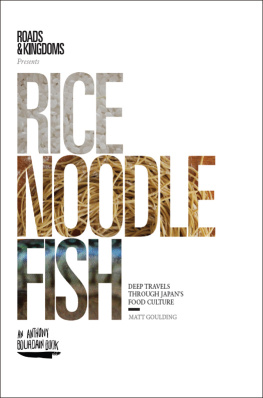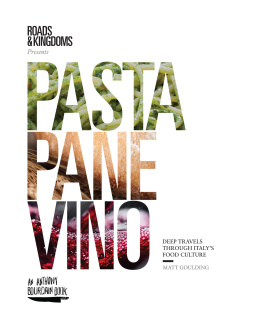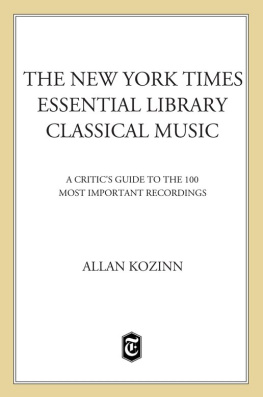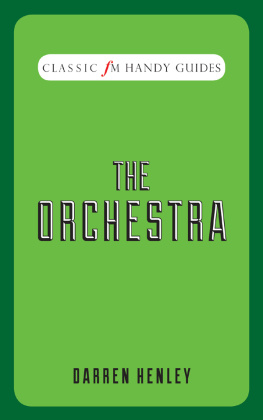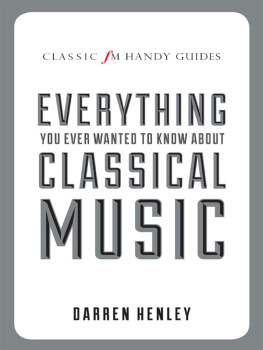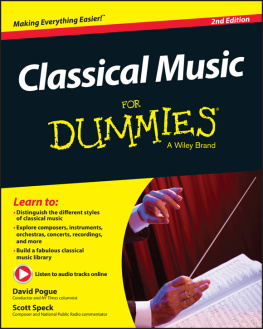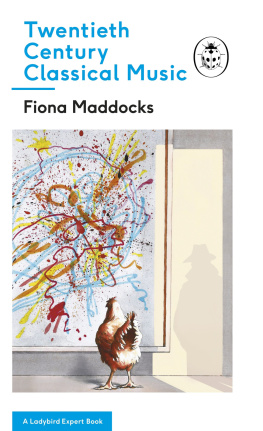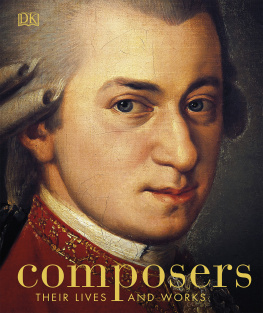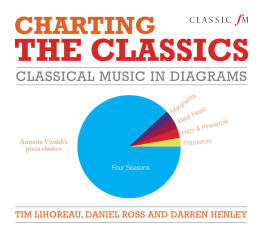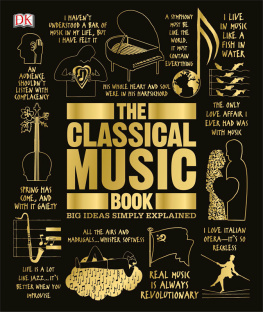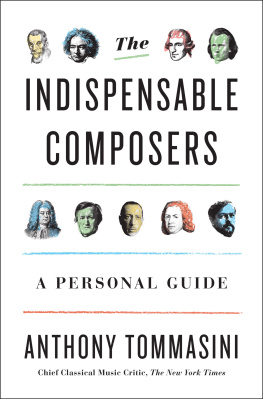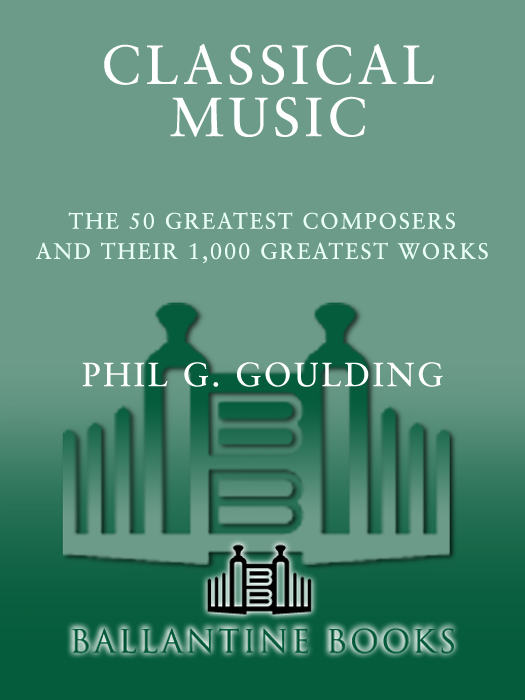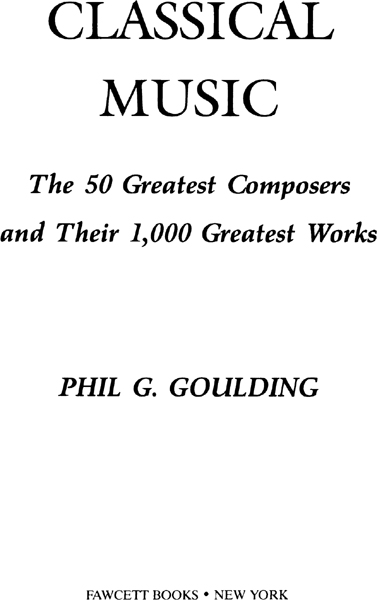The 20 Greatest Composers
Bach
Mozart
Beethoven
Wagner
Haydn
Brahms
Schubert
Schumann
Handel
Tchaikovsky
Mendelssohn
Dvok
Liszt
Chopin
Stravinsky
Verdi
Mahler
Prokofiev
Shostakovich
R. Strauss
To find out why these men are the best of the best, read on.
For
Miriam, my life,
And Bob, my brother
Contents
Chapter I
Chapter II
Chapter III
Chapter IV
Chapter V
Chapter VI
Acknowledgments
At Hamilton College in the late 1930s and early 1940s the student Honor System was practiced. On each paper the student wrote: This is my own work unless otherwise indicated.
This book on music is my own work, in one sense, since I put it together over seven years. But I must also indicate that 95 percent of it comes from used bookstores, new bookstores, and assorted public libraries, including the Library of Congress, and 4.9 percent from interviews with people in the music world.
As stressed throughout the book, I began this project as a total nonexpert and, in the true sense, I remain a nonexpert. Reporters used to write things called Sunday stories, and perhaps they still do. A Sunday story was a wrap-up, considerably longer than a daily piece and based on picking the brains of the insiders. This book is a long Sunday piece; for the most part the insiders are some two hundred to three hundred authors whose brains and works I have pickedacademicians, conductors, composers, critics, and performers. I read no foreign language well enough for this purpose, so all the books I used were written in or translated into English. Most, but not all, were published in this century.
My major acknowledgment, then, goes to all of those who really do know something about music, and on whom I have relied in this research effort. The inevitable mistakes and distortions are, of course, mine and mine alone.
Others include Hannah and Dan Henkin, old and lovely friends who tragically died much too young within a week of one another. Dan and I were reporters together covering the Pentagon and later worked together in the government. Several years ago, he and Hannah took a trip to England with my wife and me. As the trip planner, I used four yellow legal-sized pads. Later, in the early days of this project, when I began to consider it a dumb idea, Dan strongly encouraged me. But he also wisely warned my wife: Miriam, dear, this is going to be a hundred-pad thing. His estimate was woefully low.
The indispensable partner was my administrative assistant for fifteen years, Mary Lewis, who put in a few hours of illegal company time on the computer (I had not then gone beyond the manual typewriter) and thousands of hours of her own time, nights, weekends, and holidays. She declined to type if she could not track the meaning. I have no better friend, and without Mary this would not have been.
I am always indebted to my five real children. With them grown and gone, their stepsiblings during these book years were a tiny Pomeranian named Blueberry Muffin (who died at seventeen), a sixty-five-pound Bearded Collie named Angus, and a ninety-five-pound Bernese Mountain Dog named Grindel. All three provided full-time loveand, respectively, warmth and affection, amusement and entertainment, and security against invasion.
Without Miriam, I could not write the alphabet.
From my earliest memory and through this day, in all things of life, the love and support from my older brother Bob has been total.
Although I met some helpful people in the music world, my only two friends from it are Peter Greenough, whose wife, Beverly Sills, is into opera, and Stephen Klein, Executive Director of the National Symphony. I attempted to discuss this project with them, but both looked at me in a peculiar fashion and went away.
My youngest son, in his thirties, summed up the view of many: Father, he said, I would not buy a book from a publisher who would publish a book by you on classical music.
Nonetheless, here it is, because of Jolle Delbourgo, Editor-in-Chief of Ballantine Hardcovers. I am grateful not only for her initial decisions, but also for her insight and professionalism throughout. And I want to give special thanks to Lesley Malin Helm of Ballantine for her day-to-day, line-by-line editing and counsel. Lesley has understood what I have attempted to do, and to the extent that it works she is responsible. To the extent that it does not, neither she, Danny, Miriam, Angus, nor Grindel are to blame.
Introduction
S even years ago my wife, Miriam, gave me a tape deck for Christmas. We didnt have much in the way of music-making machines, and it was time, Miriam suggested, for me to acquire some music couth. My reading tastes were acceptable, and my professional life had been spent in and around the media and government in Washington, so it was safe to take me out to dinner. Musically speaking, however, I was an embarrassment at age sixty-three.
Well buy some good tapes, she said, and youll learn about music.
This appeared to be a reasonable idea, and one simple enough to implement. The first decision: What kind of music? Jazz? Opera? Folk, country, or western? The Beatles? Big-band sounds, to which I had not-too-smoothly danced in high school before the last big war our country won?
No, we agreed, lets not be intimidated. Lets go right to classical musiclater narrowed to Western classical music of the last three or four hundred years. We would start buying some cassette tapes for my new tape deck and in a few months would have the beginning of a little classical library. We wouldnt worry about long-playing records, since the family turntable was a relic, and compact discs were then new gadgetry beyond the capabilities of my tape machine.
I would like to remember that we chose classical music because of a simmering deep within me since my youth, but thats really not the way it happened. Classical music seemed to offer the greatest mystery and the greatest challengeand, therefore, maybe the most fun.
Nor were there then plans for this book, even though writing, unlike music, has been a big part of my professional life. My background included fifteen years as a Washington newspaper correspondent, and I had also written a book on the Pentagon, the press, and the public after serving as assistant secretary of defense under Robert McNamara, Cyrus Vance, and Clark Clifford. Initially, however, I just wanted to play with my new toy and make music a hobby.
But the writing background and the music did merge along the way. That marriage produced this book, an organization primer for:
those who are just beginning with classical music, know little, and want to know more;
those who own a few records and tapes and plan to build on them;
those who have been listening and collecting on a hit-or-miss basis for years, but with little musical background and perhaps even less system;
those who enjoy an occasional concert and find program notes interesting, but too often condescending and somewhat over their heads;
and those who know something of Bach and Brahms, but nothing of Bartk or Borodin.


